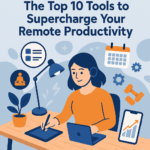How to Build a Nomad-Friendly Career
Remote work is no longer a perk – it’s becoming the foundation of how ambitious professionals design their lives. But being a digital nomad isn’t just about buying a one-way ticket and working from a beach. To truly build a career that’s nomad-friendly, you need a strategy that blends income security, professional growth, and lifestyle freedom.
This guide draws on current research, industry insights, and practical examples to show you how to build a career that supports your wanderlust and your bank account.
1. Understand What “Nomad-Friendly” Really Means
A nomad-friendly career isn’t just “any job you can do with Wi-Fi.” It balances three key factors:
-
Flexibility: Can you set your hours and location, or does the company require fixed schedules?
-
Stability: Does the work provide consistent income (or at least predictable client flow)?
-
Scalability: Can you grow skills, build equity (like a personal brand or portfolio), and increase income over time?
Research highlight: A 2024 MBO Partners study found that over 17 million Americans now identify as digital nomads, with the fastest growth among professionals in marketing, consulting, and IT. These careers typically score high in flexibility and scalability.
2. Target Careers That Travel Well
Certain industries and roles are naturally nomad-friendly:
-
Technology & IT: Software development, UX/UI design, QA testing, cloud consulting.
-
Marketing & Creative: Content writing, design, SEO, social media management.
-
Consulting & Strategy: Business coaching, HR consulting, recruiting (particularly niche talent sourcing).
-
Education & Training: Online tutoring, e-learning design, language teaching.
-
Finance & Operations: Bookkeeping, financial planning, virtual assistance, project management.
Hidden gem: Remote recruiting is a quietly booming field. Companies need global talent, and recruiters with digital skills can build careers that scale — while working from anywhere.
3. Build Portable Skills
The best insurance policy for nomadic life is a skill set that is:
-
In-demand globally (tech, marketing, data, education).
-
Independent of geography (skills you can deliver without local licensing).
-
Brand-able (things you can package into consulting or freelance services).
📈 Research highlight: LinkedIn’s 2025 Future of Work report lists AI literacy, data storytelling, and project management as the most transferable skills across industries — making them perfect for digital nomads.
4. Diversify Your Income Streams
Relying on one client or employer can leave you stranded. Successful nomads often combine:
-
Remote employment (steady paycheck, benefits).
-
Freelance gigs (flexibility, extra income).
-
Passive streams (affiliate marketing, newsletters, online courses).
This portfolio approach provides resilience when client work slows or you take time off to travel.
Monetization tip: Even nomads with full-time jobs can layer on micro-streams like affiliate blog posts, Gumroad guides, or newsletters. These build long-term equity.
5. Master Digital Infrastructure
Nomadic success depends on your tech stack as much as your résumé. Essentials include:
-
Project management & workflow: ClickUp, Monday.com (affiliate tie-ins here).
-
Asynchronous communication: Loom, Slack, Notion.
-
Time zones & scheduling: Calendly, World Time Buddy.
-
Financial stack: Wise, Payoneer, Revolut for global payments.
-
Security: VPNs, password managers, encrypted storage.
Hidden gem: Deel or Remote platforms help freelancers and employees handle taxes, visas, and compliance while working abroad.
6. Consider Legal & Financial Logistics
Research consistently shows that many digital nomads underestimate this part — and it’s where careers collapse. Plan ahead for:
-
Visas & Residency: Countries like Portugal, Spain, and Thailand now offer digital nomad visas.
-
Taxes: Understand whether you still owe in your home country (e.g., U.S. citizens are taxed worldwide).
-
Health & Insurance: Nomad-specific health plans (SafetyWing, Cigna Global).
-
Retirement: Keep contributing to retirement accounts even while abroad.
7. Build a Personal Brand, Not Just a Résumé
Nomads who thrive long-term aren’t just “remote workers” — they’re visible, trusted professionals. Invest in:
-
A personal website or portfolio (resume website is a huge differentiator).
-
LinkedIn thought leadership (share insights about your field, not just travel photos).
-
Community building (online groups, masterminds, or your own newsletter).
Research highlight: Freelancers with a strong online brand report 3–4x higher average income than those without (Upwork, 2024).
8. Create Sustainable Routines
The biggest myth of digital nomadism is that productivity happens “naturally” in exotic locations. In reality, success requires structure:
-
Work rituals: Morning focus sessions, time-blocked schedules.
-
Wellbeing: Movement breaks, mindfulness apps (Stretchly, Remente).
-
Boundaries: “Digital sunset” rules for shutting off work before exploring.
9. Test Before You Leap
Before selling everything and moving abroad, test the lifestyle:
-
Start with work-from-anywhere weeks in your current job.
-
Try a workcation in a different city to stress-test your routines.
-
Join a nomad hub like Lisbon, Medellín, or Bali for 1–3 months.
10. Think Long-Term Career Capital
Nomad-friendly careers aren’t about escaping responsibility; they’re about creating leverage. Make sure your journey builds:
-
Skills employers want.
-
A portfolio that speaks globally.
-
Assets you can own (content, products, communities).
This way, even if you stop traveling, your career trajectory continues upward.
Freedom Built on Strategy
A nomad-friendly career is more than just Wi-Fi and wanderlust. It’s a system: portable skills, multiple income streams, digital infrastructure, and a professional brand. Done right, it lets you design life on your terms — working from Paris cafés, Thai co-working spaces, or your favorite hometown spot — without sacrificing income or growth.
The future of work is flexible. The question is: will you build your career to match it?
